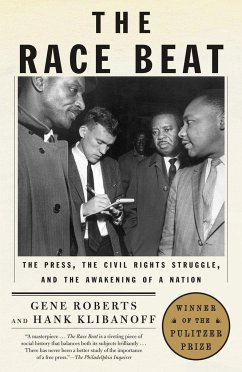An unprecedented examination of how news stories, editorials and photographs in the American press and the journalists responsible for them profoundly changed the nation s thinking about civil rights in the South during the 1950s and 60s.
Roberts and Klibanoff draw on private correspondence, notes from secret meetings, unpublished articles, and interviews to show how a dedicated cadre of newsmen black and white revealed to a nation its most shameful shortcomings that compelled its citizens to act. Meticulously researched and vividly rendered, The Race Beat is an extraordinary account of one of the most calamitous periods in our nation s history, as told by those who covered it.
Roberts and Klibanoff draw on private correspondence, notes from secret meetings, unpublished articles, and interviews to show how a dedicated cadre of newsmen black and white revealed to a nation its most shameful shortcomings that compelled its citizens to act. Meticulously researched and vividly rendered, The Race Beat is an extraordinary account of one of the most calamitous periods in our nation s history, as told by those who covered it.
A masterpiece . . . The Race Beat is a riveting piece of social history that balances both its subjects brilliantly . . . There has never been a better study of the importance of a free press. The Philadelphia Inquirer Fascinating. . . . Just when you think there's nothing left to say about the civil rights movement, [The Race Beat] pulls you back in. The Los Angeles Times The Race Beat has good characters, good yarns and good thinking. Just as important, though, it s got a good heart. Newsweek Research for The Race Beat is meticulous, uncovering many facts that have gone unreported in other books about the movement . . . proves a necessary addition to anyone interested in learning more about the movement and the journalists whose work helped transform the South and, indeed, the nation. Chicago Sun-Times








